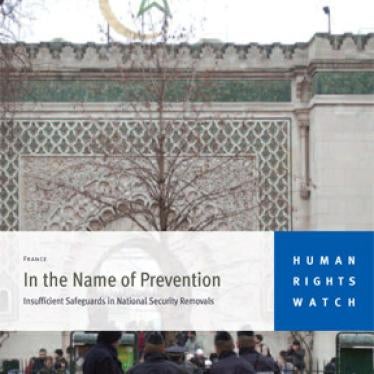The lack of safeguards in France’s policy of expelling foreign residents with alleged links to violent extremism undermines human rights and alienates communities whose cooperation is critical to the fight against terrorism, Human Rights Watch said in a report released today.
In France and other European Union countries, the forced removal of foreigners suspected of extremism is increasingly seen as a tool to counter violent radicalization and terrorist recruitment. Since September 2001, the French government has removed more than 70 individuals it describes as “Islamic fundamentalists,” including at least 15 who were Muslim clerics (or imams). However, the French policy lacks adequate safeguards against human rights violations, including torture. Appeals based on risk of torture or other human rights grounds do not automatically suspend removal.
On May 11, the United Nations Committee Against Torture condemned France for expelling a terrorism suspect, Adel Tebourski, to Tunisia despite credible evidence that he faced a risk of torture upon return. This is the second such finding against France by the UN body in the past four years.
“France is entitled to remove foreign nationals who threaten national security, provided it respects human rights in the process,” said Holly Cartner, Europe and Central Asia director at Human Rights Watch. “But as the recent UN anti-torture committee decision makes clear, France’s safeguards in these cases aren’t up to scratch.”
The 92-page report, “In the Name of Prevention: Insufficient Safeguards in National Security Removals", examines administrative expulsions of imams and others deemed to foment extremism. It also documents the criminal deportation of persons convicted of terrorism-related offenses. Based on 19 case studies, the report concludes that the procedures lack the necessary guarantees to prevent serious violations of France’s obligations under international human rights law.
The forced removals policy is part of France’s preventive approach to countering terrorism. Without fair and transparent procedures for removals, these measures are likely to subvert the goals of protecting public safety and promoting social cohesion, the report says. The forced removal of imams and long-term residents is viewed with great concern within France’s Muslim population, the largest in Western Europe, and it risks alienating these communities.
“Preventing terrorism isn’t just about effective policing and intelligence work,” Cartner said. “It’s also about winning hearts and minds. Cutting corners on human rights when it comes to forced removals sends the wrong message to Muslims in France.”
The French government’s expulsion of imams whom it describes as “hate preachers” has drawn international attention. The Interior Ministry orders these expulsions on the basis of intelligence reports that do not disclose either their sources or the methods, making the accusations virtually impossible to meaningfully rebut. In cases examined by Human Rights Watch, the men were accused of expressing ideas that many would find deeply offensive, but which nonetheless did not amount to the kind of direct incitement to violence that would justify such an extreme interference with the right to freedom of expression.
“The direct incitement of violence, discrimination or hostility should be dealt with in the criminal justice system,” said Cartner. “But people should not be expelled from a country they call home simply for expressing ideas, however offensive and shocking.”
National security removals impact the right to family life of those subject to removal and their relatives. Those forcibly removed include men who were born in France or lived there from a very young age, as well as individuals married to French citizens or long-term residents, and those with children who have French citizenship. Unless a serious threat to national security is convincingly established, these removals infringe on the right to family of both the individuals themselves and especially of their family members in a way that violates international law.
The report contains concrete recommendations to the French government to bring its procedures fully into compliance with its obligations under international human rights law, including by:
- Allowing persons subject to forced removal to remain in France until the determination of any appeal on human rights grounds or asylum appeal; and,
- Improving and applying more fairly the system of assigning individuals to compulsory residence in France as an alternative to forced removal in cases where removal would breach human rights law.







